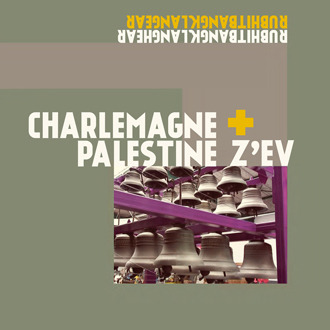The ringing, the jangling, the clanging, the dinging. The banging, the bumping, the rumbling, the knocking. There must be an alternative Earth, somewhere, sometime, where two similar aesthetics have already met. One where the purity of sound could vibrate for an indefinite amount of what resembled ‘time’ and ‘distance’; one where waves propagated in a setting of no beauty or ambience: the matter and its shapes eventually destroyed the essence of sound and light. Will a giant teddy bear restore the artlessness of a memory somehow embedded in our subconscious? Can a toy cavort with the solemn albeit easily mislead human conscious? No, it can’t, but it can try.
Minimalist composer Charlemagne Palestine and percussionist luminary Z’ev met in 2010 in the former’s dwelling, better known as Charleworld, that is both a physical locus filled with carillon bells and shruti boxes, and the sort of relationship the artist enjoys with his inner self and the spiritual world when he’s at one with his music.
Rubhitbangklanghear/Rubhitbangklangear is the result of three days spent in June 2010 creating sounds, as part of music label Sub Rosa’s Laboratoire Central sessions. Although that was not the first time that Z’ev and Charlemagne Palestine played together, this album is the first recorded testimony of their collaboration.
If Z’ev’s inescapable contribution to the origin and growth of industrial music was almost a by-product of the musician’s versatility and fascination with performance art, Charlemagne Palestine’s radical take on music has always been as static and linear as his obsession with bells. Bells that, it is true, can be found all over the place in classical pieces like Tchaikovsky’s bombastic 1812 Overture, or on Mahler’s Symphony No. 6, let alone the coronation scene on Mussorgsky’s Boris Godunov, but which almost never took centre stage the way they do with Palestine.
Rub, hit, bang, klang, hear, rub, hit, bang, klang, ear is a declaration of intents, rather than a title. It is an amalgam of simple rhythmic patterns and slight variations revolving around a percussionism which flows while mingling and blending. It is the dialectical clash of two aesthetics whose melodic output betrays an interest in something beyond the nude idea of music in itself that allures experimentalists of all kinds and importance. The key, here, is instead the concept of resonant, pulsating harmonies recalling Tony Conrad and La Monte Young’s early works by resorting to pure improvisation, rather than composition. The outcome is an exercise in associative thinking leading to minimalism and, from there, to primitivism and a state of apparent naivety. But nothing is fortuitous or shallow, and everything is unrepeatable, on Rubhitbangklanghear/Rubhitbangklangear.
The timbres and tones are pure consequences of two modus operandi which, despite the different artistic paths, converge at a precise point: this record. It is ‘Duo C/Z #3’ (the third track ça vas as dire) and its obsessive resorting to two notes in the same fashion as Palestine’s clusters on Strumming Music. And it is ‘Duo C/Z #1’, with its stark contrast between Z’ev’s rumbling bass sounds and the celestial, upward frequencies brushed by his counterpart. It is a work of two worlds penetrating each other while retaining their independent take on contemporary music. It may ring, jangle, clang and ding. Or bang, bump, rumble and knock. But such is the talent of these two legends, that the resulting work is so compellingly entertaining that it almost finds itself on the verge of accessibility to a wider audience.


